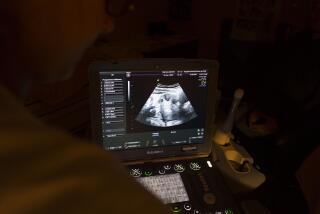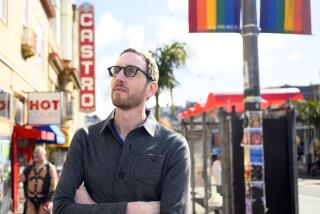Bill Would Provide Millions to Speed Up Vaccine Against AIDS
- Share via
SACRAMENTO — In an effort to speed development of an AIDS vaccine by California manufacturers, a bipartisan group of legislators Tuesday unveiled a bill providing $6 million to test promising vaccines in human beings and $20 million for the state purchase of 1 million doses when testing is successfully completed.
The measure would also make the state responsible for injuries to anyone who received the state-subsidized vaccines, while limiting recovery to $250,000 per case.
The bill was enthusiastically endorsed by two California genetic engineering companies, Genentech Inc. of South San Francisco and Chiron Corp. of Emeryville, both of which are hard at work on a vaccine and probably would benefit from the legislation.
However, scientists from both firms stressed that, even if testing goes smoothly, a mass immunization program is many years away.
Predicting that the total number of Californians stricken by acquired immune deficiency syndrome will climb to 45,000 by 1990, Assemblyman John Vasconcellos (D-Santa Clara) told a press conference that the bill is intended to accelerate the discovery of a vaccine by guaranteeing a market and by removing impediments to development and sales.
“The components that could lead to the discovery of an AIDS vaccine exist,” Vasconcellos said. “Yet because of certain financial conditions, there is often a greater market for growth hormones for hogs and cattle than there is for human vaccines.”
The legislation specifies California companies because Chiron and Genentech approached Vasconcellos with the idea, he said later.
“If someone from Connecticut wanted to be part of it, we might have to look more closely at (opening it up to out-of-state companies),” he said. “It’s California money for California companies for a California problem.”
Among the bill’s supporters are Sen. Ed Davis (R-Valencia), Assemblyman Robert W. Naylor (R-Menlo Park), Assembly Speaker Willie Brown (D-San Francisco) and Assemblyman Mike Roos (D-Los Angeles).
The National Institutes of Health are conducting extensive research into the makeup of the AIDS virus with the hope of developing a cure and an effective vaccine to combat the fatal disease.
Scientists at the National Cancer Institute are vaccinating monkeys with a protein found in the coating of the AIDS virus to see if it protects the animals from later infection, said Dr. Flossie Wong-Stael, of the institute’s laboratory of tumor cell biology.
The results are still several months away, she said. Preliminary tests in humans must wait for proven success in the animals.
Scientists from Chiron and Genentech argued that several laboratories are needed to test different approaches to developing a vaccine. Both companies have claimed firsts in characterizing the AIDS virus and its key components--steps that have helped make discovery of a vaccine possible.
Executives of both firms noted the financial obstacles to vaccine research, including the high cost of animal and human testing and the fear of lawsuits once a vaccine is developed.
Because of liability problems, many U.S. firms have dropped out of the vaccine manufacture business, said Dr. Loring Dales, chief of immunization for the state Department of Health Services.
Only one company, for example, now manufactures polio vaccine. In the 1960s, Dales said, there were three. As companies have dropped out, the costs of vaccines have risen dramatically, Dales said. The state now purchases diphtheria-tetanus-pertusis vaccine for $2.30 a dose. Three years ago, the vaccine cost only 11 cents.
More to Read
Get the L.A. Times Politics newsletter
Deeply reported insights into legislation, politics and policy from Sacramento, Washington and beyond. In your inbox twice per week.
You may occasionally receive promotional content from the Los Angeles Times.










